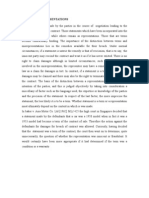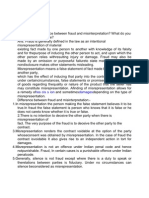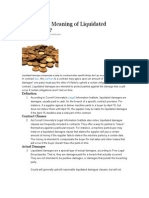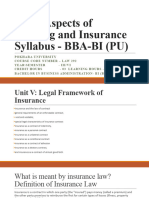Extravagant or There Was Significant Inequality of Bargaining Power. He Emphasized The
Extravagant or There Was Significant Inequality of Bargaining Power. He Emphasized The
Uploaded by
tsangjw1Copyright:
Available Formats
Extravagant or There Was Significant Inequality of Bargaining Power. He Emphasized The
Extravagant or There Was Significant Inequality of Bargaining Power. He Emphasized The
Uploaded by
tsangjw1Original Description:
Original Title
Copyright
Available Formats
Share this document
Did you find this document useful?
Is this content inappropriate?
Copyright:
Available Formats
Extravagant or There Was Significant Inequality of Bargaining Power. He Emphasized The
Extravagant or There Was Significant Inequality of Bargaining Power. He Emphasized The
Uploaded by
tsangjw1Copyright:
Available Formats
The commercial world is largely governed by commercial contracts.
Where there is a
transaction between two parties, a contract is usually formed establishing the obligations
and the liabilities of the parties. Where parties use standard form contracts to expressly
agree on the consequences of breach, the question arises as to what extent, and should,
agreed remedies be enforceable. Some argue that parties know best whilst others argue
that court intervention is justified in protecting the weaker and more vulnerable party
from exploitation or abuse as a result of low bargaining power. There is no consistency in
the manner in which the court interferes in the determination of remedies in the event of a
breach of contract. In England, a payment clause is enforceable when it functions as a
liquidated damages clause but 'disregarded' when it is held to be a penalty clause.
However, whether there is an actual distinction between these types of remedies is
arguable
Contracts allow parties to incur reciprocal obligations and to make promises the other
party can reasonably rely on. The underlying principle of freedom of contract states that
it is the free choice of the parties whether they bind themselves, when they bind
themselves and to what they bind themselves through contracts. The non-intervention of
parliament or the judiciary removes uncertainties which may hinder contracts, thereby
allowing parties to establish reasonable expectations for future actions without fearing
being compromised by intervention. Contract law should respect party autonomy and
thus should be guided by the will of the parties and by their mutual consent; after all, they
entered into a contract for a reason. Although, in principle, freedom of contract extends
to the context of remedies, the law intervenes in some situations and thus, undermines the
principle.
Commercial contracts are generally established between two established businesses, not
weak and vulnerable individuals. Thus, there is a general assumption that the parties are
knowledgeable and have the benefits of legal advice. This means that big companies are
able to look after themselves, their rights and interests, without the protection by the
courts. By interfering in contracts between commercial parties, the courts may undermine
the commercial efficacy of the contract. Lord Woolf stressed in Philips Hong Kong that
courts should adopt a hands off approach unless the sums stipulated were obviously
extravagant or there was significant inequality of bargaining power. He emphasized the
exceptional nature of the penalty jurisdiction and that courts have always avoided
claiming that they have any general jurisdiction to rewrite the contracts. Thus, courts
should notbe too ready to find the requisite degree of disproportion lest they impinge
on the parties freedom to settle for themselves the rights and liabilities following a
breach of contract. But, as I shall argue, this is not always the case.
The broadened scope of liquidated damages is evidence that the courts are usually
reluctant compromise the principle of freedom in commercial contracts. Lord Dunedin in
Dunlop v New Garage held that the mere labeling of liquidated damages by the parties,
while relevant, is not conclusive; the court will take into account the intention of the
parties as to its purpose, whether it is genuinely to calculate loss or to punish and to deter
breach. So long as it is a genuine attempt to assess loss, the courts are likely to regard the
clause to be enforceable. Yet, the position of the law has since changed, it is held that
some clauses which are neither a penalty nor a genuine pre-estimate of loss, might still be
enforceable. It was held that commercially justifiable clauses should be enforceable
provided the dominant purpose is not to deter breach. Accordingly, a clause giving rise to
a very high level of liquidated damages may not be a penalty, as long as it is
commercially justifiable. Thus, the court is willing to uphold clauses in commercial
contracts where parties have been legally represented in negotiating the terms. It is
obvious that the court is willing to depart from the tradition principle of genuine pre-
estimate of loss and adopt a more flexible and non-traditional approach towards the
enforceability of a liquidated damages clause, in order to respect parties commercial
interests and thereby, to uphold the principle of freedom of contract.
The legal division of agreed damages clause, resulting in a separation between liquidated
damages and penalty clauses rests on the assumption that they have an explicitly divisible
nature. This analysis is problematic. In practice, the courts will not be over-zealous to
characterize a clause as oppressive or penal. There are clearly commercial benefits of
allowing the parties to know with as much certainty as possible the risks they face when
they enter into a contract and judicial intervention will be detrimental for business
dealings as it compromises predictability. There is a high threshold for clauses to be
regarded to be penal - the sum must be 'extravagant and unconscionable'
1
. This protects
the principle of freedom of contract and allows commercial parties to know in advance
what risk they are taking and what happens if there is a breach, without feeling threatened
by judicial intervention.
There is a certain paradox in the termination rules which highlights the contradictions
with the penalty rules. Court intervention is limited in termination clauses; There is no
test of fairness or reasonableness or a requirement of good faith. The rules rest on the
assumption that termination satisfies commercial efficacy. Yet, the inherent coercive
nature of termination clauses to deter breach arguably functions in the same way as
penalty clauses. The law encourages performance of contractual duties whilst dismissing
penalty clauses for doing just that. Judicial control tends to be more stringent over
penalty clauses as opposed to its more liberal attitude towards self-help termination
clauses.
The remedies of deposits and penalty clauses share a lot of common characteristics, but
the law treats them differently. As with penalty clauses, deposits seek to deter breach by
forcing the other party to perform because they would not want to forfeit their deposit.
As a general rule, a deposit will be forfeited to the payee on the default of the payer, the
loss capable of being much more than the actual loss suffered by the payee, thus
subjected to extremely harsh 'penalty'. Even the definition of a deposit reiterates its
innately coercive nature - it is a payment that acts as a guarantee that the contract shall be
performed. The only distinction between a deposit and a penalty clause seems to be that
the party in breach has already transferred his money. The harsher aspect of deposits have
been somewhat mitigated; The Law Commission No.61 provisionally concluded that the
fact that a deposit in paid in advance is not sufficient and that deposits made should be
subject to the penalty rules. But this only applies where a deposit is 'unreasonable' in
relation to the loss likely to be suffered and a deposit for the sale of land that does not
1
Dunlop v New Garage
exceed 10% was considered as reasonable. A 'reasonable' deposit is thus not the same as
a genuine pre-estimate of loss. The threshold of unreasonableness is not easily satisfied
which means that deposits are usually enforceable; judicial control tends to be more
stringent over penalty clauses as opposed to forfeiture clauses, which arguably may
subject the party in breach to the very same harsh penalty.
Whilst penalty clauses are struck out automatically, exemption clauses which have
arguably the same purpose, are subject to a reasonableness test under the Unfair Contract
Terms Act 1977. Exemption clauses can be seen as the binary opposite of penalty
clauses; rather than penalizing the contract breaker for breach, it limits compensation to
the innocent party. Courts are generally reluctant to intervene and prefer to leave the
parties free to allocate the risks
2
in business contracts, especially where the parties are of
comparable bargaining power and can insure against risks. A loose approach was adopted
in Photo Production v Securicor Transport, deterring interference in commercial
contracts. The courts are often reluctant to disregard exemption clauses in commercial
contracts by adopting a more flexible approach towards the reasonableness test under
UCTA; this respects parties commercial interests and thereby, to uphold the principle of
freedom of contract
It is often criticised that the English courts are too harsh by invaliding all penalty clauses
in commercial contracts and thereby undercuts the principle of freedom of contract.
Critics have compared the treatment of penalty clauses in English courts to that of
Frances, which has adopted a different approach to penalty clauses. Instead of
invalidating all punitive damages clauses, courts should only invalidate abusive clauses.
Jobson v Johnson held that the penalty clause is not simply struck out but enforced to
the extent that it does not function as a penalty. By 'scaling down' the clause and
enforcing it to the extent that it does not function as a penalty, rather than 'wholly
disregarding' it, the court is in essence 'modifying' the clause. Whilst it can be seen that
the penal element of the clause is not entirely suppressed in France, Jobson v Johnson
nevertheless is a convergence of approach between the two systems. Its hybrid character
allows it to encourage performance of contractual obligations and to act as a pre-estimate
of damages for breach of a contractual obligation.
To conclude, by interfering with commercial contracts, I argue that English law
undermines the principle of freedom of contract in the context of remedies and thus,
prevents parties from protecting their interests adequately. The interaction of the penalty
clause rules with other areas of contract law produces contradictions and inconsistencies
that are difficult to defend. The common law presents difficulties by explicitly
prohibiting a penalty clause by reason of its coercive element while at the same time
implicitly tolerating a coercive element in other clauses. The court adopts a more lenient
approach towards termination clauses and deposits but a harsher approach towards
penalty clauses and specific performance clauses. Thus, the intervention by the court in
trying to protect the interests of the parties is undermined as the remedy with the lighter
treatment i.e. deposits could replace that with the harsher treatment i.e. penalty clauses.
2
Watford Electronics Ltd -v- Sanderson CFL Limited
You might also like
- Contracts, 7th (Hornbook Series - Joseph PerilloDocument1,506 pagesContracts, 7th (Hornbook Series - Joseph PerilloAntonio95% (22)
- Contract of LeaseDocument5 pagesContract of LeaseRalph Christian Lusanta Fuentes100% (1)
- Liquidated DamagesDocument25 pagesLiquidated DamagesFrank Victor Mushi100% (1)
- Assessment of Damages in Tort and ContractDocument14 pagesAssessment of Damages in Tort and ContractNur Aliah100% (1)
- Contract Law 3 Short NotesDocument9 pagesContract Law 3 Short NotesWaseem Ahmad QurashiNo ratings yet
- Chapter 9 Real MortgageDocument6 pagesChapter 9 Real MortgageSteffany Roque100% (3)
- Terms and RepresentationsDocument2 pagesTerms and Representationsmsyazwan100% (1)
- Res Cis S Ion DamagesDocument12 pagesRes Cis S Ion DamagesPrateek KhandelwalNo ratings yet
- Law of ContractDocument7 pagesLaw of ContractIzwan Farhan100% (1)
- 3-GDEHKL Contract Law - Exemption ClausesDocument62 pages3-GDEHKL Contract Law - Exemption ClausessamsheungNo ratings yet
- Exclusion clause noteDocument19 pagesExclusion clause notemorgan.y.hkuNo ratings yet
- 2016 S C M R 296Document106 pages2016 S C M R 296junaid khanNo ratings yet
- Law of ContractDocument7 pagesLaw of ContractIzwan FarhanNo ratings yet
- SSRN Id1032759 PDFDocument28 pagesSSRN Id1032759 PDFAnonymous 94TBTBRksNo ratings yet
- Contract Law - Time Limits, Breach and Remedies - Duhaime - Org - Learn LawDocument5 pagesContract Law - Time Limits, Breach and Remedies - Duhaime - Org - Learn LawMichael BenhuraNo ratings yet
- Dembe Dangale 08ha1900848 General Principles of Law of Contract (HGPLC230-1) Formative Assessment 1Document8 pagesDembe Dangale 08ha1900848 General Principles of Law of Contract (HGPLC230-1) Formative Assessment 1dangale418No ratings yet
- Distinguish Between Penalty and Liquidated Damages 1663495793Document8 pagesDistinguish Between Penalty and Liquidated Damages 1663495793Mohamed KareemNo ratings yet
- Contract ProjectDocument10 pagesContract ProjecthimanshuNo ratings yet
- Appendix 2: Types of Exclusion ClauseDocument1 pageAppendix 2: Types of Exclusion ClauseThiện NguyễnNo ratings yet
- 1148 Liquidated Damages in Construction ContractsDocument3 pages1148 Liquidated Damages in Construction Contractskian hongNo ratings yet
- 1 What Is TortDocument8 pages1 What Is TortDonasco Casinoo ChrisNo ratings yet
- Law Answer 1Document31 pagesLaw Answer 1Chander SanbhiNo ratings yet
- International Newsletter-Liquidated Damages in Middle EastDocument4 pagesInternational Newsletter-Liquidated Damages in Middle EastRanjith PriyanagaNo ratings yet
- Obligations and Contracts With Examples PDFDocument20 pagesObligations and Contracts With Examples PDFeddieNo ratings yet
- Liquidated DamagesDocument5 pagesLiquidated DamagesappigaNo ratings yet
- An A To Z of Contract Clauses-1Document5 pagesAn A To Z of Contract Clauses-1Claudia MaglionaNo ratings yet
- Namakau Law 2Document6 pagesNamakau Law 2Evangelist Kabaso SydneyNo ratings yet
- Tubbs v MwamukaDocument4 pagesTubbs v MwamukanyakungutheresaNo ratings yet
- BreachDocument18 pagesBreachVijaya BanuNo ratings yet
- Unenforceable ContractDocument9 pagesUnenforceable ContractMarivic Asilo Zacarias-LozanoNo ratings yet
- JPrivIntL Interpreting Non-Exclusive Jurisdiction Agreements Merrett Final 2Document32 pagesJPrivIntL Interpreting Non-Exclusive Jurisdiction Agreements Merrett Final 2Shantel ScottNo ratings yet
- What Is An Unenforceable ContractDocument5 pagesWhat Is An Unenforceable ContractJarvy PinonganNo ratings yet
- Liquidated Damages Clauses LectureDocument8 pagesLiquidated Damages Clauses LectureralsadonyNo ratings yet
- Unit V Legal Framework of InsuranceDocument22 pagesUnit V Legal Framework of InsurancegenazvaliNo ratings yet
- Exemption Clause in The Law of Contract-60532061Document19 pagesExemption Clause in The Law of Contract-60532061Eldard MkNo ratings yet
- Good Faith in Commercial Law: Insurance Contracts in BangladeshDocument56 pagesGood Faith in Commercial Law: Insurance Contracts in BangladeshAl RafaNo ratings yet
- PagelawDocument6 pagesPagelawLuisNo ratings yet
- Suveksha DocumentDocument3 pagesSuveksha DocumentSuveksha PantaNo ratings yet
- Asma Mam 1Document8 pagesAsma Mam 1Mohd SajidNo ratings yet
- Exemption ClausesDocument37 pagesExemption ClausesAmanda Penelope Wall100% (1)
- Contract TerminationDocument12 pagesContract Terminationmalasunder100% (3)
- Assessment of Damages in Tort and ContractDocument14 pagesAssessment of Damages in Tort and ContractshahiraazNo ratings yet
- Commercial Contracts A Practical Guide To Standard TermsDocument20 pagesCommercial Contracts A Practical Guide To Standard TermsTrúc PhạmNo ratings yet
- TOPICDocument9 pagesTOPICPaschal JaphetNo ratings yet
- Common Types of Contract Clauses A-ZDocument4 pagesCommon Types of Contract Clauses A-ZMuhammad ArslanNo ratings yet
- Indemnity Provisions in Energy AgreementsDocument30 pagesIndemnity Provisions in Energy AgreementsJoySarkerNo ratings yet
- Exclusionary Clauses and Exemption ClausesDocument6 pagesExclusionary Clauses and Exemption ClausesLesly R MposhiNo ratings yet
- bm519 1Document7 pagesbm519 1Mohd SajidNo ratings yet
- Courts Enforce What Parties Write - Anderlini-Felli-PostlewaiteDocument15 pagesCourts Enforce What Parties Write - Anderlini-Felli-Postlewaitejorge plaNo ratings yet
- Good CDDocument4 pagesGood CDKhan farazNo ratings yet
- Basic Principles of ContractsDocument3 pagesBasic Principles of ContractsNel TongNo ratings yet
- FrustrationDocument9 pagesFrustrationM Arif Hussain100% (1)
- Contract: Primary TabsDocument3 pagesContract: Primary Tabsprint maadiNo ratings yet
- Repudiatory Breach of Contract: Traps For The Unwary: March 2005Document2 pagesRepudiatory Breach of Contract: Traps For The Unwary: March 2005Arepalli Venkateswara RaoNo ratings yet
- Contract LawDocument56 pagesContract LawDownload_Scribd_stuf0% (1)
- Youngblood Flocos PracticalLawyerDocument17 pagesYoungblood Flocos PracticalLawyerKnowledge Guru100% (1)
- Contracts of AdhesionDocument1 pageContracts of Adhesiondermawan_salimNo ratings yet
- Unconscionability and Standard Form of ContractDocument7 pagesUnconscionability and Standard Form of ContractAravind KumarNo ratings yet
- Standard Form Contracts A Comprehensive Analysis Ijariie3494Document5 pagesStandard Form Contracts A Comprehensive Analysis Ijariie3494Saavir Kuckreja100% (1)
- Introduction to Contracts for Entrepreneurs and Startup: Fundamentals of Contracts and English Contract LawFrom EverandIntroduction to Contracts for Entrepreneurs and Startup: Fundamentals of Contracts and English Contract LawNo ratings yet
- Filinvest Credit Corp V CADocument2 pagesFilinvest Credit Corp V CATrisha OrtegaNo ratings yet
- ContractsDocument21 pagesContractsAditi SoniNo ratings yet
- Paras Notes For ObliconDocument38 pagesParas Notes For ObliconBelle Cabal100% (1)
- Law of ContractDocument23 pagesLaw of ContractMd. Fazle Rabbi Spondon 190041211No ratings yet
- Dixon v. Wells Fargo - Edited - Case - FileDocument5 pagesDixon v. Wells Fargo - Edited - Case - FileLuis Enrique Polanco AriasNo ratings yet
- UntitledDocument4 pagesUntitledmarsonhardware staffNo ratings yet
- Indemnity and Guarantee AssignmentDocument5 pagesIndemnity and Guarantee AssignmentShayan KhanNo ratings yet
- Sale of Goods Act - 1930Document192 pagesSale of Goods Act - 1930jerijose1987No ratings yet
- Mia 1906Document40 pagesMia 1906Ender TVNo ratings yet
- Test Bank CH 12Document14 pagesTest Bank CH 12Linh KhánhNo ratings yet
- Mom Omo MomoDocument369 pagesMom Omo MomoorsbsoulNo ratings yet
- Sale of Goods Act 1930Document44 pagesSale of Goods Act 1930Sayantan MondalNo ratings yet
- Reg MDTDDocument5 pagesReg MDTDvandv printsNo ratings yet
- Short-Form Personal GuaranteeDocument3 pagesShort-Form Personal Guaranteehuangpeter55No ratings yet
- BUS201 - SU5 - Guidelines For Analysis - Discharge and Damages PDFDocument11 pagesBUS201 - SU5 - Guidelines For Analysis - Discharge and Damages PDFShi YeeNo ratings yet
- Indemnity Bond To Be Executed by The StudentDocument4 pagesIndemnity Bond To Be Executed by The Studentkarthik ummaganiNo ratings yet
- Obligations and Contracts (Chapter 3 Sec 5)Document3 pagesObligations and Contracts (Chapter 3 Sec 5)LeeshNo ratings yet
- Ong V PcibDocument2 pagesOng V PcibKaye100% (1)
- Bar Review SALES - URIBEDocument3 pagesBar Review SALES - URIBEDolly MifanaNo ratings yet
- Acctg 202 A Module Part TwoDocument190 pagesAcctg 202 A Module Part TwoColeen gaboyNo ratings yet
- Business Law - MistakeDocument15 pagesBusiness Law - MistakeKashish PremwaniNo ratings yet
- Performance of Contract: Prepared By: Shrota Baral Roll - No. 89 BALLB Fourth SemesterDocument24 pagesPerformance of Contract: Prepared By: Shrota Baral Roll - No. 89 BALLB Fourth SemesterShrota BaralNo ratings yet
- 1 (2) PDF - 240126 - 071947Document23 pages1 (2) PDF - 240126 - 071947zaneledubenNo ratings yet
- OBLICON - Art. 1179Document5 pagesOBLICON - Art. 1179Anonymous llEdzzFINo ratings yet
- Lecture Notes: Common Law Contracts Lecture Ii: Defences, Damages and Remedies Dr. Wilder, University of BonnDocument15 pagesLecture Notes: Common Law Contracts Lecture Ii: Defences, Damages and Remedies Dr. Wilder, University of BonnNur Un NaharNo ratings yet
- Law of Contract-2 - Project Work - Odd Sem - 2022-23Document2 pagesLaw of Contract-2 - Project Work - Odd Sem - 2022-23mysterious xNo ratings yet
- IN2205423-2 Container Cleanliness Certificate - 25% - DraftDocument2 pagesIN2205423-2 Container Cleanliness Certificate - 25% - DraftSuraj Kapse100% (1)

























































































